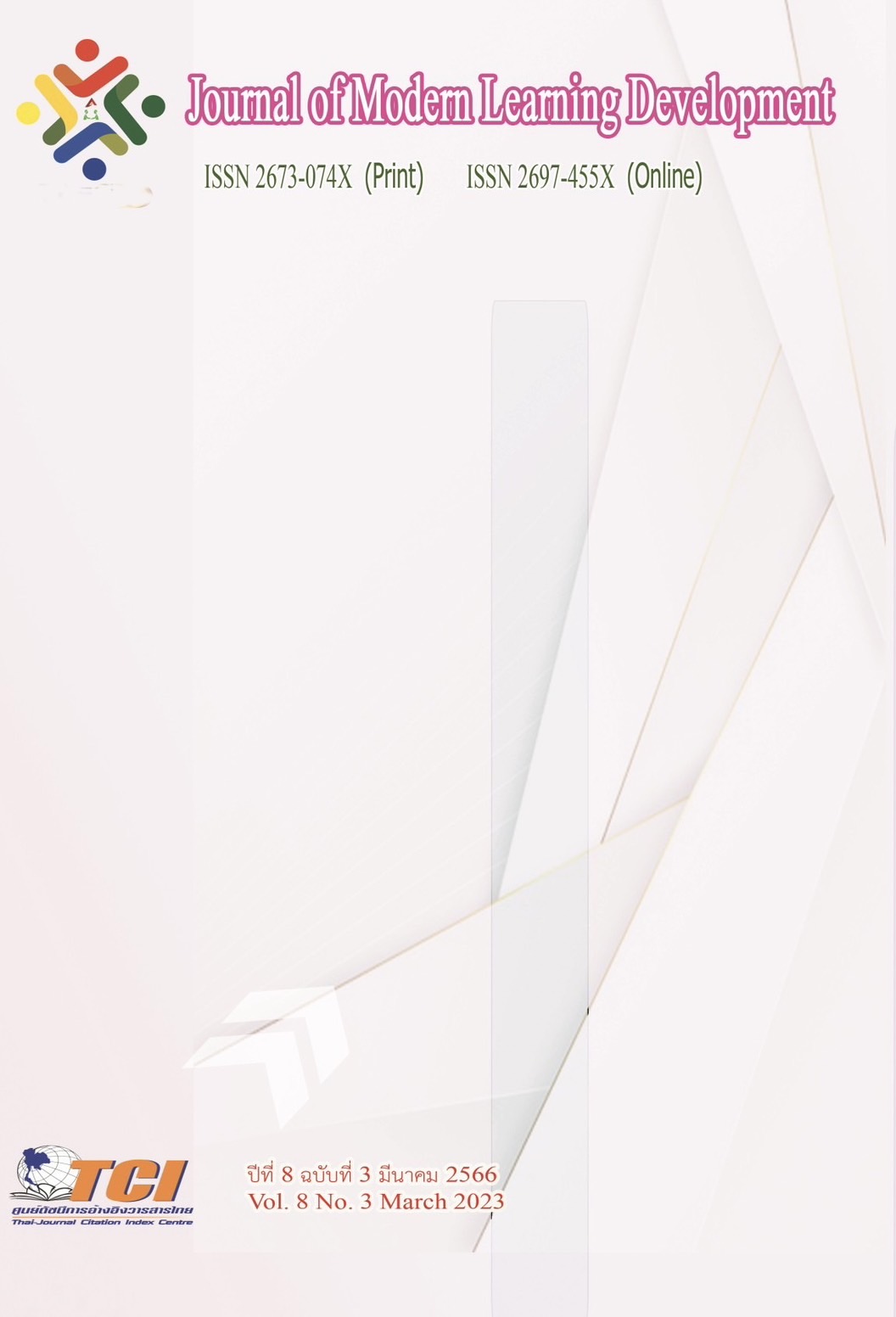Higher Education Classroom Research Subject: Learning of Buddhist subjects by students in the Bachelor of Public Administration program Phetchaburi Monastic College
Main Article Content
Abstract
The objectives of this research were: (1) to study the pre-study and post-study outcomes of students who received participatory learning management techniques; (2) to study the students' attitudes in learning Buddhist subjects ( 3) Study the satisfaction of learning with a student-centered approach. The sample group used in this research were undergraduate students of Phetchaburi Sangha College. Bachelor's degree in Public Administration, first year, who are studying in the academic year 2022, consisted of 40 students. Study and learn 30 items. (3) Attitudes in the subject of Buddhism 10 items.
The results showed that
1. To study the achievement of individual students in Buddhism of the students who received management. Learning after school was statistically significantly higher than before at the .01 level.
2. Most of the students received the learning management as a learner as a priority. had the highest level of attitude towards Buddhism
3. Most of the students who received the learner-centered learning management were satisfied with learning at a high level
Article Details
References
กรมสุขภาพจิต. (2544). คู่มือการฝึกอบรมแบบมีส่วนร่วม. กรุงเทพมหานคร: วงศ์กมลโปรดักชั่น,
คณะกรรมการการศึกษาแห่งชาติ, สำนักงาน. (2542). พระราชบัญญัติการศึกษาแห่งชาติ พ .ศ.2542. หนังสือพระราชบัญญัติการศึกษาแห่งชาติ .
ดาวคลี่ ศิริวาลย์. (2543). ผลการเรียนรู้ของนักเรียนมัธยมศึกษาชั้นปีที่1ที่เน้นการประยุกต์ รูปแบบการเรียนแบบร่วมมือ. รายงานการวิจัยปริญญามหาบัณฑิต. มหาวิทยาลัยเกษตรศาสตร์.
เบญจมาศ ทรัพย์ธำรงศ์. (2549). การเปรียบเทียบผลสัมฤทธิ์ทางการเรียนวิชาการเงินธุรกิจ ระหว่างนักศึกษาคณะบริหารธุรกิจสาขาการจัดการและสาขาวิชาภาษาอังกฤษธุรกิจ โดยวิธีสอนที่เน้นผู้เรียนเป็นสำคัญ. รายงานการวิจัย. มหาวิทยาลัยเทคโนโลยีราชมงคล.
พิมพันธ์ เดชะคุปต์ . (2545). การเรียนการสอนวิทยาศาสตร์ด้วยการเน้นกระบวนการเพื่อสร้างความรู้สำหรับครูมัธยมศึกษา. ประมวลบทความ นวัตกรรมเพื่อการเรียนรู้สำหรับครู ยุคปฏิรูปการศึกษา เล่ม 2. กรุงเทพมหานคร: คณะคุรุศาสตร์ จุฬาลงกรณ์มหาวิทยาลัย.
ไพฑูรย์ สินสารัตน์. (2543). เทคนิคการสอนอุดมศึกษา.ส่วนวิจัยพัฒนาสำนักมาตรฐาน อุดมศึกษา ทบวงมหาวิทยาลัย. กรุงเทพมหานคร: คุรุสภา.
ทิศนา แขมมณี. (2545). ศาสตร์การสอน. (พิมพ์ครั้งที่ 2). กรุงเทพมหานคร: จุฬาลงกรณ์มหาวิทยาลัย.
ธีระชัย ปูรณโชติ . (2531). กรณีศึกษาการทำโครงงานวิทยาศาสตร์. (พิมพ์ครั้งที่ 2). กรุงเทพมหานคร: จุฬาลงกรณ์มหาวิทยาลัย.
สมนึก ภัททิยธนี. (2541). การวัดผลและประเมินผลทางการศึกษา. คณะศึกษาศาสตร์มหาวิทยาลัยมหาสารคาม.
สุขเสนอ อินทะไชย์. (2546). รูปแบบการสอนที่เน้นผู้เรียนเป็นสำคัญ วิชาความรู้เบื้องต้น เกี่ยวกับการประกอบธุรกิจ ตามหลักสูตรประกาศนียบัตรวิชาชีพชั้นสูง สำหรับ วิทยาลัยชุมชน พุทธศักราช 2538. ปริญญามหาบัณฑิต. บัณฑิตวิทยาลัย: มหาวิทยาลัยมหาสารคาม.
อนงค์ วิเศษสุวรรณ์. (2550). การจัดการเรียนรู้ที่เน้นผู้เรียนเป็นสำคัญ Facilitating Student - Centered Learning. วารสารศึกษาศาสตร์ มหาวิทยาลัยบูรพา . 18 (2), 1-10.
อรพรรณ พรสีมา. (2540). การเรียนแบบร่วมแรงร่วมใจ ทฤษฎีและแนวคิดเรื่องการเรียนรู้แบบมี ส่วนร่วม. กรุงเทพมหานคร. เจริญผล


